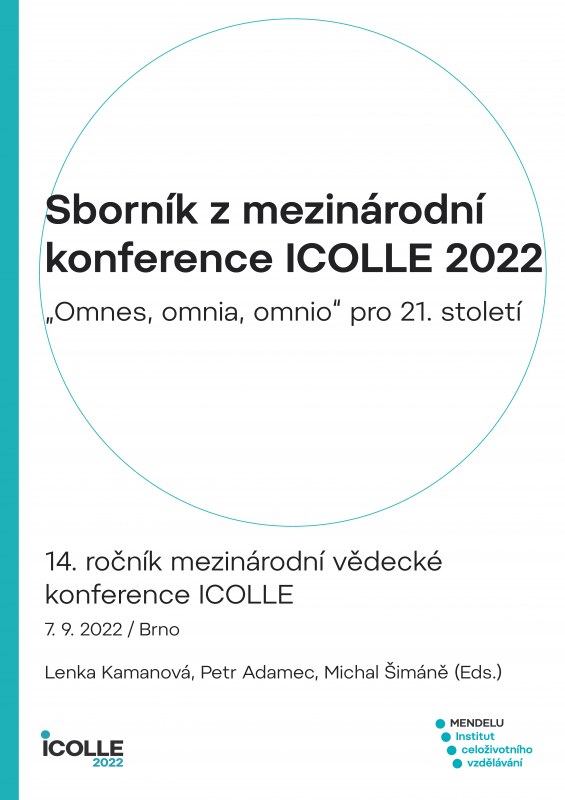
DOI: 10.11118/978-80-7509-922-8-0148
„OMNINO“ ‑ A COMPREHENSIVE DEVELOPMENT IN EXTRACURRICULAR ACTIVITIES OF UNIVERSITY STUDENTS
- Lívia Nemcová, Viktória Šoltésová
Developing the all‑round competences of university students by applying the principle of credit recognition for the implementation of relevant extracurricular activities (EA), case studies and recommendations for practice (e.g. in the Service Learning programme, in teacher‑oriented programmes and training in the preparation of future teachers, as well as in non‑formal education in parachurch organisations in the case of students of theology, etc.). The starting point is Directive No. 11/2021 on the recognition of ECTS credits for extra‑curricular activities at Matej Bel University (MBU) and its implementation in practice. The paper is an output of the funded project VEGA 1/0409/21 (National Agency of the Slovak Republic). The theoretical basis is the required learning outcomes of university students in selected fields of study and their expected competences. These outcomes are compared with learning outcomes in selected educational extra‑curricular activities implemented outside the university of which they are students. This is a set of case studies of selected educational programs that are not courses in higher education but have the potential to provide specifically beneficial learning outcomes for college students whose completion may also earn them credit for extra‑curricular activities. We conclude with recommendations for practice regarding the comparison of learning outcomes in parallel curricular and extra‑curricular activities that are expected to yield the development of transversal competencies for college students in selected fields of study.
Keywords: „omnino“/universal, extracultural activities, non–formal education, tertiary education
pages: 148-154, online: 2023
References
- Brozmanová Gregorová, A. (2019a). Service learning ako pedagogická stratégia angažovanej univerzity a jej vybrané prínosy pre študentstvo. Banská Bystrica: Vydavateľstvo Univerzity Mateja Bela Belianum.
- Brozmanová Gregorová, A. (2019b). Globálne vzdelávanie na slovenských vysokých školách vo výzkumných súvislostiach. Banská Bystrica: Vydavateľstvo Univerzity Mateja Bela Belianum.
- Collins, J. (2009). Education Techniques for Lifelong Learning. Lifelong Learning in the 21st Century and Beyond. Radiographics, 29(2), 613-622. DOI: https://pubs.rsna.org/doi/pdf/10.1148/rg.292085179
 Go to original source...
Go to original source... - Hanesová, D. (2015). Plurilingual and Intercultural Awareness of Future Teachers. The New Educational Review, 42(4), 79-90.
 Go to original source...
Go to original source... - Hawley, J., Otero, M. S. & Duchemin, C. (2010). Update to the European Inventory on Validation of Non-formal and Informal Learning - Final Report. GHK, Directorate-General for Education and Culture. Dostupné na: http://ec.europa.eu/education/more-nformation/doc/2010/inventory_en.pdf
- Kioupi, V. & Voulvoulis, N. (2022). The Contribution of Higher Education to Sustainability: The Development and Assessment of Sustainability Competences in a University Case Study. Education Sciences, 12(406). DOI: https://doi.org/10.3390/educsci12060406
 Go to original source...
Go to original source... - KPV (2022). Dostupné na: https://www.teofania.sk/teofania/Co‑je‑Klin‑past‑vzdlavanie‑a13_64.htm
- EC. (2000) Memorandum o celoživotnom vzdelávaní sa. Pracovný materiál Európskej komisie. Brusel: Komisia európskych spoločenstiev. Dostupné na: https://www.minedu.sk/9772‑sk/dokumenty‑a‑predpisy/
- Nemcová, L. & Šolcová, J. (2020). Neformálne vzdelávanie detí a mládeže. Vysokoškolská učebnica. Banská Bystrica: Vydavateľstvo Univerzity Mateja Bela Belianum.
- Novotná, E. (2017). Pedagogika voľného času: teória výchovy mimo vyučovania vo voľnom čase. Prešov: Rokus.
- Novotná, H., Špaček, O. & Šťovíčková, M. (Eds.). (2019). Metody výzkumu ve společenských vědách. FHS UK.
- Popescu, L. G. (2017). University and non‑formal education. MATEC Web of Conferences. 121, 12014. Dostupné na: https://www.researchgate.net/publication/319011250_University_and_non‑formal_education
 Go to original source...
Go to original source... - Procházka, P. (2010). Church‑Related Higher Education in the Slovak Republic. In: Pusztai, G. (Ed.). Religion and Higher Education in Central and Eastern Europe. Debrecen: University of Debrecen, CHERD, s. 95-110.
- Recognition of Non‑formal and Informal Learning. OECD. Dostupné na: http://www.oecd.org/education/skills‑beyond‑school/recognitionofnon‑formalandinformallearning‑home.htm
- Rovňanová, L. & Nemcová, L. (2017). Integration of Theoretical and Practical Undergraduate Training in the Processes of Developing Student Teachers' Professional Competences. The New educational review, 47(1), 176-186.
 Go to original source...
Go to original source...


